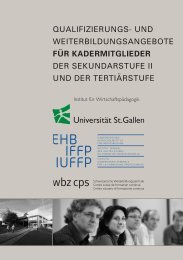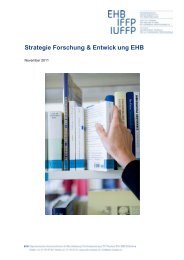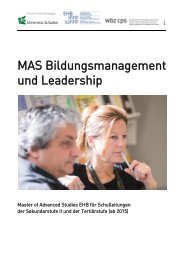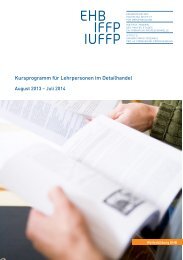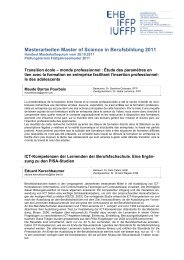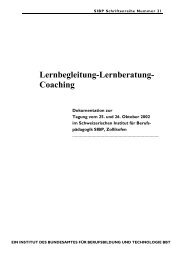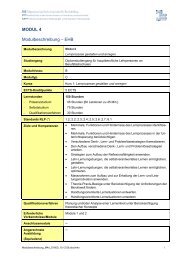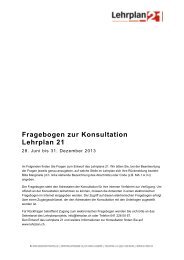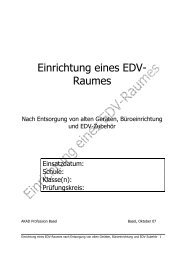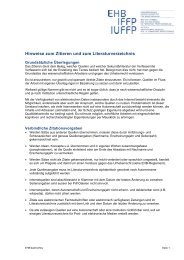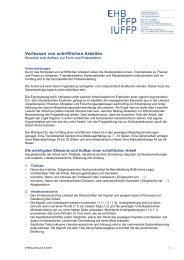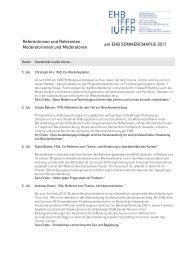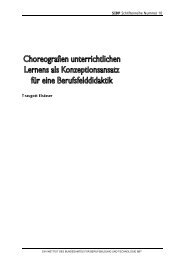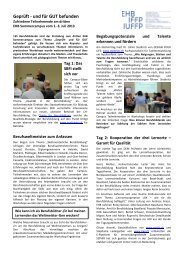Challenge Teacher Education: A new Approach to Pre ... - EHB
Challenge Teacher Education: A new Approach to Pre ... - EHB
Challenge Teacher Education: A new Approach to Pre ... - EHB
Create successful ePaper yourself
Turn your PDF publications into a flip-book with our unique Google optimized e-Paper software.
Manfred <strong>Pre</strong>nzel<br />
TUM School of <strong>Education</strong><br />
<strong>Challenge</strong> <strong>Teacher</strong> <strong>Education</strong>:<br />
A <strong>new</strong> <strong>Approach</strong> <strong>to</strong> <strong>Pre</strong>-service<br />
<strong>Teacher</strong> Training<br />
Vocational <strong>Education</strong> and Training <strong>Challenge</strong>s:<br />
Developing Skills and Competences for the Future<br />
Berne/Zollikofen, 24 March 2011<br />
Overview<br />
1. Perceptions of “the” teacher<br />
2. Reference for teacher training: The<br />
quality of an educational system<br />
3. Research on teaching and learning<br />
shows specific challenges<br />
4. Different picture in vocational education?<br />
5. Modelling teacher competencies<br />
6. A fresh approach <strong>to</strong> pre-service teacher<br />
training
An U.S. image campaign<br />
Be a hero!<br />
Be a teacher!<br />
<strong>Teacher</strong>s have the power <strong>to</strong> wake up<br />
young minds - <strong>to</strong> make a difference.<br />
Reach for that power.<br />
Be a teacher. Be a hero.<br />
... and an ancient s<strong>to</strong>ry:<br />
„Ouch! I’ve got an untrained teacher“<br />
(Petrarca, 1519, Trostspiegel)
The challenges for education are growing<br />
Background:<br />
• Demographic change<br />
• Knowledge society<br />
• Globalisation<br />
• Sustainability<br />
• Equity<br />
...and, with that,<br />
the demands for<br />
teacher education<br />
Calvin’s perspective<br />
(from Bill Watterson, Calvin & Hobbes)
Mrs. Wormwood’s reaction<br />
Overview<br />
1. Perceptions of “the” teacher<br />
2. Reference for teacher training: The<br />
quality of an educational system<br />
3. Research on teaching and learning<br />
shows specific challenges<br />
4. Different picture in vocational education?<br />
5. Modelling teacher competencies<br />
6. A fresh approach <strong>to</strong> pre-service teacher<br />
training
Mathematics<br />
performance<br />
PSIA 2009<br />
For comparison:<br />
2006: 504 points<br />
2003: 503 points<br />
2000: 490 points
Mathematics performance by school type<br />
.<br />
.<br />
Mathematics performance by school type<br />
Proficiency level<br />
IV: 4.6 %<br />
Proficiency level I<br />
and below: 18.6 %
.<br />
Mathematics performance by school type<br />
Going <strong>to</strong> vocational education!<br />
A follow-up study of PISA 2003<br />
(PISA-I-plus)<br />
An extension of the national<br />
sample of PISA 2003 was<br />
assessed twice in Germany:<br />
At the end of grade 9, and<br />
again at the end of grade 10<br />
(in mathematics and science<br />
in 2004). The sample included<br />
two complete classrooms per<br />
school.<br />
<strong>Pre</strong>nzel et al. (2006)
Mathematics performance at the end of grade 9 and<br />
grade 10 (individual level, latent growth)<br />
Mathematics performance 2004, grade 10<br />
Mathematics performance 2003, grade 9<br />
Gain on<br />
average:<br />
25 points<br />
(d = .33)<br />
For 58 % of the<br />
students a<br />
relevant gain in<br />
mathematics<br />
performance in<br />
the course of<br />
one school<br />
year was<br />
observed<br />
In <strong>to</strong>o many cases: No sustainable learning!<br />
• 42 percent of the students did not improve their<br />
mathematic performance during the course of one year<br />
of schooling<br />
• Almost all the students, however, passed successfully<br />
the teacher-made exams<br />
• Students (& teacher & parents) tend <strong>to</strong> support a kind<br />
of short-term learning <strong>to</strong> the test<br />
• Large scale assessments, in contrary, sum up the<br />
sustainable outcome of longer periods of learning, and<br />
measure, “what is left”
Mathematics performance at the end of grade 9 and<br />
grade 10 (classroom level, latent growth)<br />
Mathematics performance 2004, grade 10<br />
Relevant gain<br />
in mathematics<br />
performance<br />
found in 89 %<br />
of the classes<br />
Mathematics performance 2003, grade 9<br />
The PISA 2003/2004 follow-up study provided the<br />
relevant data for the COACTIV project<br />
(Kunter, Baumert, Blum et al., 2011)<br />
(Krauss, Baumert & Blum, 2008)
Identifying challenges for teacher training (1)<br />
• Structural/differential approaches, using e.g.<br />
large scale studies<br />
• Longitudinal design, multi-level approach<br />
• Reliable and valid indica<strong>to</strong>rs for outcomes/<br />
progress<br />
• Assessment of teacher characteristics<br />
• Understanding, what is relevant<br />
Overview<br />
1. Perceptions of “the” teacher<br />
2. Reference for teacher training: The<br />
quality of an educational system<br />
3. Research on teaching and learning<br />
shows specific challenges<br />
4. Different picture in vocational education?<br />
5. Modelling teacher competencies<br />
6. A fresh approach <strong>to</strong> pre-service teacher<br />
training
Differences between classrooms<br />
(1) Development of performance in physics in the<br />
course of one school year<br />
(a) Knowledge (mechanics, optics)<br />
End of the year<br />
50 classrooms: Average physics<br />
performance, beginning of the year<br />
Seidel, <strong>Pre</strong>nzel et al. (2007)<br />
Differences between classrooms<br />
(2) Development of performance and interest in<br />
physics in the course of one school year<br />
(a) Knowledge (mechanics, optics)<br />
(a) Interest (mechanics, optics)<br />
End of the year<br />
50 classrooms: Average physics<br />
performance, beginning of the year<br />
50 classrooms: Average interest in<br />
physics, beginning of the year<br />
Seidel, <strong>Pre</strong>nzel et al. (2007)
Computer-based analyses of lessons allow in-depth<br />
analysis of teaching and learning processes<br />
(Videograph, Rimmele, 2002, 2004)<br />
Fac<strong>to</strong>rs that make a difference<br />
For example,<br />
• Goal orientation<br />
• Process-oriented teaching<br />
• Inquiry-based teaching<br />
(Dalehefte et al, 2009;<br />
Seidel, <strong>Pre</strong>nzel et al., 2006, 2007, 2009)
Identifying challenges for teacher training (2)<br />
• Process-oriented approaches, using e.g. video<br />
techniques<br />
• <strong>Pre</strong>-post design, multi-level approach<br />
• Reliable and valid indica<strong>to</strong>rs for outcomes/<br />
progress<br />
• Using perspectives of teachers and students<br />
• Understanding and showing, how teaching and<br />
learning work<br />
Overview<br />
1. Perceptions of “the” teacher<br />
2. Reference for teacher training: The quality of<br />
an educational system<br />
3. Research on teaching and learning shows<br />
specific challenges<br />
4. Different picture in vocational education?<br />
5. Modelling teacher competencies<br />
6. A fresh approach <strong>to</strong> pre-service teacher<br />
training
Study on self-determined and interested learning<br />
in vocational education<br />
The project (funded in the DFG Priority program<br />
“Teaching–Learning Processes in Vocational<br />
<strong>Education</strong>”, Beck et al.) included<br />
(1) A cross-sectional study<br />
(2) A longitudinal study of a small group of trainees<br />
(3) Analysis of instruction<br />
(4)An intervention study in vocational schools<br />
(<strong>Pre</strong>nzel, Kramer & Drechsel, 2002)<br />
Motivation <strong>to</strong> learn and perceived conditions at school<br />
and at the workplace (<strong>Pre</strong>nzel, Kramer & Drechsel, 2002<br />
At school<br />
At work<br />
M SD M SD<br />
Learning motivation:<br />
Amotivated 1.93 1.23 1.20 1.15<br />
External 1.71 1.23 1.22 1.19<br />
Introjected 3.29 1.10 3.76 1.07<br />
Identified 3.51 1.05 3.79 1.04<br />
Intrinsic 2.07 1.13 3.20 1.18<br />
Interested 2.40 1.10 3.08 1.12<br />
Conditions of motivated learning:<br />
Relevance of Contents 2.50 0.85 2.65 1.19<br />
<strong>Teacher</strong>’s Interest 2.00 1.06 2.71 1.29<br />
Social Relatedness 3.37 0.93 3.65 1.20<br />
Support of Competence 2.51 0.93 3.05 1.07<br />
Support of Au<strong>to</strong>nomy 2.51 0.86 3.14 1.00<br />
Quality of Instruction: Structure 3.06 0.77 2.82 1.18
Vocational school: <strong>Teacher</strong> ratings of motivational conditions<br />
compared with class ratings (<strong>Pre</strong>nzel et al. 2002)<br />
(< below, > above, • within the 5% confidence interval)<br />
Teache<br />
r<br />
Relevance<br />
<strong>Teacher</strong><br />
Interest<br />
Social<br />
relatedness<br />
Support of<br />
competence<br />
Support of<br />
au<strong>to</strong>nomy<br />
Quality of<br />
Instruction<br />
Adaptation<br />
Sum of<br />
hits<br />
1 > • > • > < • 3<br />
1 > > > > • • < 2<br />
1 > < > • > < < 1<br />
1 • • > > > > • 3<br />
2 > > > > > > < 0<br />
2 > • > > > > < 1<br />
2 > > < • > • > 2<br />
3 • • • > < • • 5<br />
4 > • > > > > • 2<br />
4 • > > > > > < 1<br />
Sum 3 5 1 3 1 3 4 20<br />
"Interested learning" rated by trainees in class B in<br />
relationship <strong>to</strong> the teacher ratings.
Identifying challenges for teacher training (3)<br />
• Diagnostic competencies<br />
• Designing powerful (motivating) learning<br />
environments<br />
• Professional perception of teaching/learning<br />
conditions<br />
Identifying challenges for teacher training (3)<br />
Professional perception of teaching/learning<br />
conditions: Development of a diagnostic <strong>to</strong>ol in the<br />
DFG Project “Observe” (Seidel & <strong>Pre</strong>nzel)<br />
• includes six short video clips of classroom<br />
• each clip is introduced by background<br />
information about the classroom situation<br />
• every clip represents two significant teaching<br />
and learning components
Overview<br />
1. Perceptions of “the” teacher<br />
2. Reference for teacher training: The<br />
quality of an educational system<br />
3. Research on teaching and learning<br />
shows specific challenges<br />
4. Different picture in vocational education?<br />
5. Modelling teacher competencies<br />
6. A fresh approach <strong>to</strong> pre-service teacher<br />
training<br />
Tradition 1: Demands on the personality of teachers’<br />
(e.g., Döring, 1931)<br />
• Exemplary way of life, strong volition, tireless diligence<br />
• Sense of justice, love of truth, value-driven actions<br />
• Self-control, patience, empathy<br />
• Desire for forming and realizing the potential of students<br />
• Appreciates neat, pretty, tactful children<br />
• Strong effort <strong>to</strong> give a fresh, friendly, and agreeable<br />
impression<br />
• Appreciates the independent existence of children<br />
• Promotes all students independent of their specific<br />
characteristic, engagement for the weak and those in need<br />
of help<br />
• Convinced of the good in each human being, tireless<br />
engagement
Tradition 1: Demands on the personality of teachers’<br />
(e.g., Döring, 1931)<br />
• Exemplary way of life, strong volition, tireless diligence<br />
• Sense of justice, love of truth, value-driven actions<br />
• Self-control, patience, empathy<br />
• Desire for forming and realizing the potential of students<br />
• Appreciates neat, pretty, tactful children<br />
• Strong effort <strong>to</strong> give a fresh, friendly, and agreeable<br />
impression<br />
• Appreciates the independent existence of children<br />
• Promotes all students independent of their specific<br />
characteristic, engagement for the weak and those in need<br />
of help<br />
• Convinced of the good in each human being, tireless<br />
engagement<br />
Tradition 2: Techniques<br />
Effective instruction provided by effective teachers<br />
Effective instruction relies on<br />
• A variety of teaching and learning approaches<br />
• An effective use of lesson time for learning<br />
• A clear, structured presentation of content and tasks<br />
• Alert conduct of instruction<br />
• Individualized pacing of learning processes<br />
• Consideration of individual prerequisites<br />
• Domain specific teaching<br />
• The affective quality of teacher-student relationship<br />
(e.g.: Fraser et al., 1987; Wang et al., 1993; Weinert/Helmke, 1997;<br />
Seidel & Shavelson, 2007; Hattie, 2009)
Tradition 3: <strong>Teacher</strong>s as experts own specific<br />
knowledge<br />
(1) Content knowledge<br />
(2) Curricular knowledge<br />
(3) „Philosophy“ of the subject<br />
(4) General educational and psychological knowledge<br />
(5) Content-specific professional knowledge<br />
(e.g., Shulman, 1987; Bromme, 2006; Baumert et al.)<br />
Implications for teacher training<br />
• (Stable) Characteristics of the teacher personality:<br />
Select suitable personalities and teach them<br />
knowledge of the subject<br />
• Process-Product: Teach knowledge of the subject<br />
as well as knowledge concerning effective<br />
instruction, and start <strong>to</strong> train techniques<br />
• Expertise: Develop varieties of knowledge , offer<br />
opportunities for application in teaching and learning<br />
situations, for practice, give feedback and initiate<br />
reflexion
Components of teacher‘s competence<br />
Competencies<br />
Defining educational goals and<br />
planning of units<br />
Diagnosis of prerequisites and<br />
outcomes of learning,<br />
understanding learning<br />
processes and their conditions<br />
Designing learning situations<br />
and environments<br />
are based on<br />
Knowledge<br />
Routines<br />
comprise<br />
Discipline and subject<br />
Didactics of the<br />
subject<br />
<strong>Education</strong><br />
Psychology<br />
Scripts for teaching,<br />
Orchestration of<br />
methods,<br />
Mastering problem<br />
situations<br />
Reflexion, evaluation,<br />
cooperation, quality assurance<br />
and development of school<br />
programmes<br />
Professional<br />
ethics<br />
Engagement<br />
reversibility, caring,<br />
discourse<br />
(cf. KMK-Perspektiven der Lehrerbildung)<br />
Overview<br />
1. Perceptions of “the” teacher<br />
2. Reference for teacher training: The quality of<br />
an educational system<br />
3. Research on teaching and learning shows<br />
specific challenges<br />
4. Different picture in vocational education?<br />
5. Modelling teacher competencies<br />
6. A fresh approach <strong>to</strong> pre-service teacher<br />
training
TUM School of <strong>Education</strong><br />
• The recently established 13. Faculty of Technische<br />
Universität München: <strong>Teacher</strong> training is one of the<br />
pillars of TUM!<br />
• Dedicated <strong>to</strong> teacher education in mathematics,<br />
science, and technology at the secondary level<br />
• for both vocational schools and grammar schools<br />
(“Gymnasium” only STEM)<br />
• <strong>Teacher</strong> Training for Vocational Schools includes:<br />
Agriculture, Construction, Technology, Electrical<br />
Technology and Computer Technology, Nutritional<br />
Studies and Home Economics, Health and Care<br />
Service, Metal Technology<br />
TUM School of <strong>Education</strong><br />
An innovative approach <strong>to</strong> pre-service teacher education<br />
Qualification/<br />
Research<br />
Output<br />
University<br />
Students’<br />
<strong>Pre</strong>requisites
TUM School of <strong>Education</strong><br />
An innovative approach <strong>to</strong> pre-service teacher education<br />
Qualification/<br />
Research<br />
Output<br />
University<br />
Knowledge<br />
Competencies<br />
Motivation<br />
Beliefs, attitudes<br />
Orientations<br />
Students’<br />
<strong>Pre</strong>requisites<br />
TUM School of <strong>Education</strong><br />
An innovative approach <strong>to</strong> pre-service teacher education<br />
Qualification/<br />
Research<br />
Output<br />
University<br />
Knowledge<br />
Competencies<br />
Motivation<br />
Beliefs, attitudes<br />
Orientations<br />
Students’<br />
<strong>Pre</strong>requisites<br />
School
TUM School of <strong>Education</strong><br />
An innovative approach <strong>to</strong> pre-service teacher education<br />
Qualification/<br />
Research<br />
Output<br />
<strong>Education</strong>al<br />
Research<br />
University<br />
Students’<br />
<strong>Pre</strong>requisites<br />
<strong>Teacher</strong><br />
Training<br />
School<br />
TUM <strong>Teacher</strong> training aims at…<br />
A profound scientific qualification with a strong<br />
connection <strong>to</strong> professional affordances and challenges.<br />
<strong>Teacher</strong>s should be qualified<br />
For designing and providing cognitive<br />
demanding, supportive and motivating learning<br />
environments,<br />
For professional collaboration and cooperative<br />
improvement of teaching and learning<br />
Multi-dimensional objectives of teacher training:<br />
-Content knowledge<br />
-Pedagogical content knowledge<br />
-Psychological/pedagogical knowledge<br />
-Personality and professional ethos
<strong>Pre</strong>-service teacher training aiming at the<br />
professional career<br />
School University 2. Phase 3. Phase<br />
<strong>Teacher</strong> biography / career<br />
Organization<br />
of TUM School of <strong>Education</strong><br />
• The School of <strong>Education</strong> administers the resources for<br />
teacher training across all faculties<br />
• The School of <strong>Education</strong> is responsible for a coherent<br />
and relevant study programmes and for the quality of<br />
teacher training<br />
• The School cooperates with a network of selected highquality<br />
schools (that are also providing internships for<br />
our teacher students),<br />
• The School is the professional home for all teacher<br />
students<br />
• The School initiates and supports educational research
Strands of studies<br />
Studies in subjects/disciplines<br />
Studies in subject matter didactics<br />
<strong>Education</strong>al Studies<br />
Practical Studies in schools<br />
Bachelor<br />
Master<br />
Strands of studies<br />
Studies in subjects/disciplines<br />
Studies in subject matter didactics<br />
<strong>Education</strong>al Studies<br />
Practical Studies in schools<br />
Bachelor<br />
Master
Goal-oriented guidance<br />
Referring <strong>to</strong> student‘s:<br />
-Content knowledge<br />
-Pedagogical content knowledge<br />
-<strong>Education</strong>al/psychological knowledge<br />
-Personality and professional ethos<br />
Student<br />
Admission/<br />
Counselling<br />
Student<br />
Admission/<br />
Counselling<br />
Bachelor<br />
Master<br />
Leading role for providing experiences<br />
Coordinated by: TUMpaedagogicum<br />
Practical studies in schools & seminars<br />
- Collaboration with schools<br />
- Workshops for men<strong>to</strong>rs<br />
- Scripts, tasks, portfolios<br />
- Information basis<br />
- <strong>Pre</strong>paring students (research-based<br />
- Reflection /Teaching-learning cycles<br />
Bachelor<br />
Master
Principles of TUM School in short<br />
Advice from the Beginning<br />
Curriculum orientiation<br />
Didactics<br />
Evaluation<br />
... and …<br />
Men<strong>to</strong>ring<br />
Practice<br />
Research<br />
Concomitant research:<br />
A panel study including structures and outcomes of<br />
teacher training at 13 universities<br />
Structure of studies & quality of<br />
learning opportunities<br />
Professional<br />
Knowledge<br />
Values &<br />
Beliefs<br />
Motivational<br />
Orientations<br />
Cross-curricular<br />
Competencies<br />
Individual prerequisites and use of<br />
learning opportunities
Technische Universität München<br />
Thank you for your attention<br />
Levels of action in an educational system<br />
Level<br />
Quality of educational<br />
outcomes<br />
Individual<br />
Teaching and learning<br />
Classroom<br />
Parents<br />
School<br />
&<br />
Context<br />
<strong>Teacher</strong><br />
Traning<br />
Curriculum Media Context<br />
Cultural and socioeconomic background<br />
System<br />
(<strong>Pre</strong>nzel, 2005)
Research emphasis at TUM School of <strong>Education</strong><br />
• Teaching and learning in schools and universities<br />
(patterns of instruction, effects, innovative<br />
approaches)<br />
• Development of competencies and assessment<br />
• Qualifications of teachers and educational staff<br />
(diagnosis, competences, development)<br />
• School settings (cooperation, leadership,<br />
management, programme, quality assurance)<br />
• Learning outside of school (informal settings,<br />
labora<strong>to</strong>ries)<br />
5. Ergebnisse aus der Lehr-Lern-Forschung<br />
Zusammenhang zwischen Bedingungen und der Qualität der<br />
Lernmotivation<br />
Korrelationen zwischen den Varianten motivierten Lernens und ihren<br />
Bedingungen am Lernort Betrieb (n=866) p ≤ 0,01 (<strong>Pre</strong>nzel et al. 2002)<br />
Inhaltliche<br />
Relevanz<br />
Interes<br />
se der<br />
Lehrperson<br />
Soz.<br />
Einbindung<br />
Kompetenzunterstütz<br />
ung<br />
Au<strong>to</strong>nomieunterstütz<br />
ung<br />
Klarheit<br />
Instru<br />
ktion<br />
Überforderung<br />
Amotiviert -.13 -.23 -.36 -.28 -.35 -.14 -.30<br />
External -.10 -.21 -.37 -.27 -.35 -.11 -.35<br />
Introjiziert .14 .21 .34 .24 .26 .13 .12<br />
Identifiziert .34 .37 .46 .43 .41 .33 .18<br />
Intrinsisch .37 .55 .60 .60 .61 .41 .20<br />
Interessiert .39 .53 .53 .57 .58 .41 .14
<strong>Teacher</strong> and student-centered activities<br />
(% of lesson time)<br />
Classrrooms<br />
(Seidel &<br />
<strong>Pre</strong>nzel, 2004)<br />
Assessing professional vision via videotaped<br />
classroom situations . . .<br />
Darling-Hammond,<br />
2006; Reusser 2005<br />
Miller & Zhou 2007<br />
Goldman 2007<br />
• are situated and contextualized<br />
stimuli.<br />
• represent the complexity of „real“<br />
classroom situations.<br />
• offer secondhand experiences of<br />
teaching



